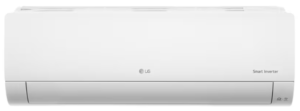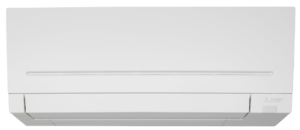Some air conditioners are a cut above the rest when it comes to cooling, and Aussies have a penchant for sticking with the ‘tried and true’ brands. Such brands are Mitsubishi Electric and LG. Ever wondered what sets the top air-conditioning manufacturers apart? Why are some more popular than others? It’s more than just clever marketing. Here, we compare the best air-con features of two major brands – Mitsubishi Electric and LG – to find out which delivers the best value and the standout technologies when it comes to keeping your home at the optimum temperature.
What’s in this guide?
How much do LG air conditioners cost?

LG air conditioners will generally cost from $1,400 to $4,000 for split system units, while ducted air-conditioning units will range in price from $5,000 up to $20,000, which generally includes the unit as well as the installation cost. The cost for ducted units will also change again depending on the size of your home, how many rooms you have and how many storeys it is.
How much do Mitsubishi Electric air conditioners cost?

Mitsubishi Electric air conditioners range in price from $900 to around $3,500 for split-system units making them a slightly cheaper option between the two brands. Similarly, you can expect to spend up to between $15,000 to $20,000 for ducted air conditioning units with price varying depending on your home’s layout.
Factors to consider when buying an LG air conditioner
LG offers a range of modern features in their air conditioners, including high-tech functions that keep the air in your home cleaner.
- Offers a more streamlined range including split system, multi-split system and ducted air conditioners.
- Child-lock function and auto-cleaning function helps minimise mould and bacteria.
- LG’s Plasmaster Ioniser Plus neutralises germs, bacteria and viruses to keep the indoor air clean.
- The Micro Dust Filter is powered by 3M technology to capture microscopic particles.
Factors to consider when buying a Mitsubishi Electric air conditioner
Mitsubishi Electric is known for its quiet air conditioners and has a large range of units to accommodate most room sizes.
- Offers a wide range of air-conditioning systems, including wall-mounted, ceiling-mounted, console split system, bulkhead and multi-head split system.
- Extra-wide angle and long airflow that distributes evenly at 150-degrees and up to 12 metres away.
- The Plasma Duo filter system purifies and deodorises air.
- Ultra-quiet – the MSZ-AP series features some of the quietest indoor units in the industry, as low as 18dB.
Choosing which brand of air conditioner to purchase
When choosing a big-ticket item like an air conditioner, comparing price, functionality and features is important. If your decision has come down to LG or Mitsubishi Electric, you’re going to be in safe hands with either brand as both offer a range of styles, prices and features. LG appears to have the edge when it comes to air purification, while Mitsubishi Electric excels at ultra-quiet units that cool your home without the noise some other brands produce.
Aside from LG and Mitsubishi Electric, there are plenty of brands that offer excellent value-for-money, functionality and features, which you can check out below.
Air Conditioner Reviews & Ratings
Original Author: Veronika Hleborodova





Share this article